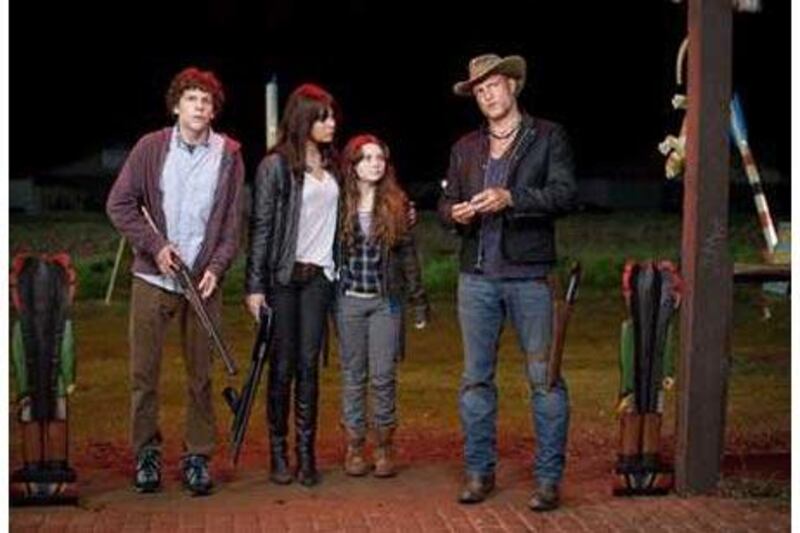Zombieland is a one-joke movie that nonetheless travels admirably far - into the third act, in fact - on that single gag: namely, what would happen if you inserted a neurotic wallflower with intellectual ambitions (an archetype more at home in Woody Allen dramas) into the fulsome pell-mell carnage of a zombie cannibal film?
The answer, initially, is delivered with self-deprecating wit and the brash genre awareness was popularised by the Scream films. Thus we are first introduced to nervy anti-hero Columbus (Jesse Eisenberg from The Squid and the Whale), a compulsive list-maker travelling through a post-apocalyptic America that has been ravaged by a lethal zombie virus. Columbus (characters are named after their hometowns; real names are deemed too upsetting, reminiscent of the old ways) survives this eminently hostile terrain by filling a small notebook with 47 handy hints for surviving zombie attacks. Illustrated examples of his rules, shown in snappy, gory, interstitial bites, include "Number 8: avoid bathrooms" - cut to shot of zombie attacking seated man from underneath public stalls. And then there's the gloriously direct "Number 1: cardio", which is overlaid with slow-motion footage of an obese man being tackled by a blood-drenched zombie on a football field. "The zombie lives an active life," observes Columbus in wry voice-over, before adding, "So should you."
So far so droll. So free from story. However, the narrative soon kicks in when Columbus meets Tallahassee (Woody Harrelson), the bizarre gun-toting cowboy, followed closely by two devious female hitchhikers called Wichita (Emma Stone) and Little Rock (Abigail Breslin). The pair join Tallahassee and Columbus on a road trip to an LA amusement park called Pacific Playland where the older, sisterly Wichita plans to give young Little Rock a traditional family day out, even if it literally kills her.
Along the way the film effectively indulges its central comedic premise by watching Columbus flail hopelessly in the face of death, and become even more emasculated next to the macho antics of Harrelson's action man. "What are you doing - prospecting?" asks a nervously stuttering Columbus, delivering one of many Allen-esque one-liners, as Tallahassee produces a giant zombie-killing pickaxe from the back of his car. Similarly, Columbus gives a fantastically deadpan account of an earlier romantic tryst with an alluring neighbour who is transformed mid-date into a zombie.
Of course, as soon as the film exhausts the comedic possibilities of Columbus's discomfit it quickly runs aground. The trip to Pacific Playland isn't strong enough to sustain an entire narrative, and so the film takes a random diversion to the Beverly Hills home of actor Bill Murray (here playing an overblown egomaniacal version of himself). The sequence is mildly amusing, and Murray seems to relish the self-satire (his mansion is dotted with the letters BM), but it only serves to underscore the fact that when a narrative veers so blatantly off-piste it isn't always a sign of directorial confidence.
For the rest of the movie, the director Ruben Fleischer and writers Rhett Reese and Paul Wernick, all television veterans making their film feature debut, simply throw their hands up in the air and let Zombieland sink under the weight of tediously overplayed ultra-violence and narrative non sequiturs. Our foursome find themselves, utterly illogically, in Pacific Playland and armed to the teeth with automatic weapons facing an interminable battle with an ever-growing throng of zombies. Here the movie suddenly expects to harness dramatic tension from a device (the slow limping attack of zombie villains) that has up until now been played entirely for laughs.
Worse still, the film completely inverts its own comedic premise and transforms Columbus into a decisive action hero. Instead of playing the original nerd-meets-zombies hook truthfully (think of Woody Allen's inept freedom fighter in Sleeper), the final battle is a transformative moment, where Columbus rids himself of self-doubt and taps his inner Rambo. Thus, the disappointingly rote answer to the original question, poised by a movie that's only briefly inventive, is that when a neurotic wallflower is inserted into the carnage of a zombie film, he does what every modern American movie hero does - he kicks ass.





